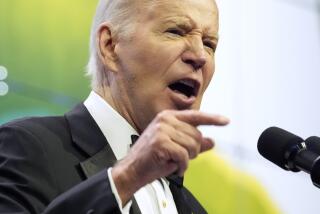More B-2s Unlikely Under Compromise Defense Bill
- Share via
WASHINGTON — The long push on Capitol Hill for more B-2 bombers ended in apparent defeat Friday as House-Senate negotiators agreed to leave the decision to President Clinton, who has adamantly opposed buying more.
In completing work on a $247.5-billion defense bill, lawmakers also voted to cut off money for the Bosnia peacekeeping mission by June. Clinton could gain more funding only by going to Congress and explaining the reasons for extending the deployment, the number of troops needed and the new withdrawal date.
“The president would have to communicate with the Congress, and he would have to make his case,” said Rep. C. W. Bill Young (R-Fla.), chairman of the House Appropriations national security subcommittee. “At this point, the president has not seen fit to make a case to anybody as to why the mission in Bosnia is extending and changing.”
Resolution of the B-2 debate almost certainly means no new bombers will be ordered--at least until next year, when advocates of the bat-winged plane are likely to take up the fight again. Clinton has said repeatedly that the Air Force has higher priorities than the B-2 and can get by with the 21 aircraft already in service or on order.
Both House and Senate members expressed disappointment with the bill. Young called it “the best job we could do with the limited financial resources available.”
The legislation completed by members of House and Senate defense appropriations subcommittees must still win floor approval before going to the president. But such major compromises are seldom changed in the final steps toward passage of a bill.
Earlier this year, the House voted narrowly to add $331 million that could be used to begin buying as many as nine more B-2 bombers in the coming years. At roughly $2 billion, the B-2 is the most expensive aircraft ever built.
Clinton had sought $174 million to continue modernization and upgrades on the existing B-2 fleet, which cost a total of $44 billion to develop and build.
Under the compromise, the defense bill would provide a total of $331 million and it would be up to Clinton to decide whether to use the money for new aircraft or for modernization of the existing fleet.
More to Read
Sign up for Essential California
The most important California stories and recommendations in your inbox every morning.
You may occasionally receive promotional content from the Los Angeles Times.













